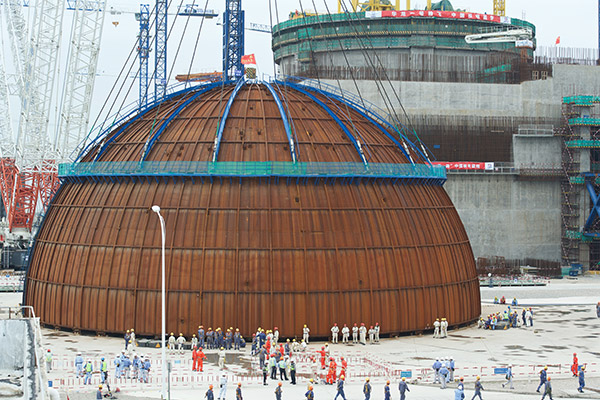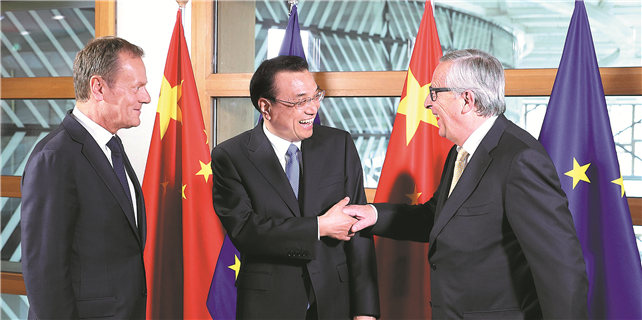Reactor offers rich opportunities
 |
|
The dome for a Hualong One reactor unit is poised in position at the Fuqing nuclear plant in Fujian province on May 25. [Photo/Xinhua] |
Building and operating a nuclear plant in a European country by a Chinese company may have sounded unimaginable a few years ago. But now nuclear reactors are about to be built using China's third-generation Hualong One reactor in the United Kingdom, and this is just the beginning.
In addition to the UK's Bradwell project consisting of two of China's homegrown Hualong One reactors, each with an output of 1.15 gigawatts, the first nuclear project in a developed market using a Chinese reactor, countries including Thailand, Indonesia, Kenya, South Africa, Turkey, Kazakhstan and the Czech Republic have shown an interest in the technology.
"After some 30 years of learning and innovation, China has mastered the independent design and manufacturing of third-generation nuclear power facilities, and has shifted from being a novice to a pioneer in the nuclear sector worldwide," said Yu Peigen, deputy general manager of China National Nuclear Corp, one of the country's largest nuclear companies.
Hualong One's first reactor overseas undertaken by CNNC-Karachi nuclear power plant unit 2 in Pakistan-started construction in August 2015, and Karachi nuclear power plant unit 3 started construction in 2016.
The company has also agreed to supply Argentina with two nuclear power reactors, and one of them will use Hualong One and start construction in 2020, bringing CNNC's overseas nuclear power units up to eight.
Chinese nuclear companies are initiating new projects across the world and have the potential to become the next major nuclear technology suppliers on the global stage together with well-tested technologies from Canada, France, Russia, South Korea and the United States, said an industry analyst.
Joseph Jacobelli, a senior analyst of Asian utilities and infrastructure at Bloomberg Intelligence, said that with government support for overseas expansion, including beneficial terms in obtaining financing from key financial institutions, this cooperation will help expand Chinese companies' knowledge of overseas markets, find new markets for Chinese know-how and offer new earnings sources.
According to Liu Wei, general manager of China Nuclear Power Engineering Co, exports of China's third-generation nuclear technology will bring massive economic benefits to the country, as each nuclear power unit export requires more than 80,000 items of related equipment involving more than 200 enterprises, which will in turn create 150,000 jobs.
Taking into account uranium, nuclear fuel, operation and maintenance, each unit could contribute some 100 billion yuan ($14.72 billion), he said.
China's first demonstration nuclear power project using Hualong One technology has recently taken shape as its containment dome was installed late last month.
Premier Li Keqiang called this a "landmark project" under the Made in China 2025 plan, stressing the need for active participation in the global market to develop a world-class nuclear power brand and contribute to the upgrading of China's manufacturing sector.
While actively exploring overseas markets to export its advanced equipment, China is also developing nuclear power projects in the domestic market.
He Yu, chairman of CGN, called for the mass production of Hualong One reactors, suggesting that China could build four to six nuclear reactors annually using Hualong One by 2020, to ensure the installed capacity of nuclear power in China reaches at least 150 gigawatts by 2030.
"The Hualong One reactor is not only safe and technically mature, but also economically competitive, and will help reduce air pollution caused by coal-fired power generation," he said.









